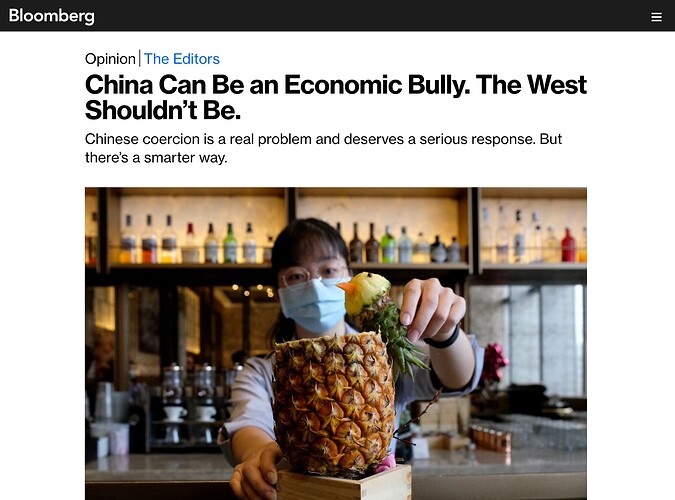-
在即将举行的七国集团峰会上,各国领导人将讨论如何应对中国的经济欺凌策略,其中包括阻止贸易、抵制品牌和切断旅游,以便向目标国施压,使其扭转反华政策。中国的行动给一些国家造成了痛苦的经济损失,许多国家选择先发制人地磕头,以避免进一步的损害。
-
欧盟和美国正在采取措施应对中国的压力,欧盟提出了一个 “反胁迫工具”,国会也考虑授予美国总统类似的权力。前北约秘书长安诺斯-福格-拉斯穆森(Anders Fogh Rasmussen)呼吁制定一个 “经济第五条”,让发达国家对胁迫其他民主国家的行为作出一致的反应。
-
七国集团应该仔细考虑对中国的任何回应,因为惩罚性关税会提高国内消费者和公司的成本,并可能降低威慑力的可信度。相反,他们应该专注于减少对中国的依赖,建立应急储备,并提供主权贷款担保和政治风险保险。任何回应都必须以维护基于规则的全球贸易体系为目标,而不是妖魔化中国。
-
At the upcoming G-7 summit, leaders will discuss how to respond to China’s economic bullying tactics, which include blocking trade, boycotting brands, and cutting off tourism in order to pressure targets to reverse anti-China policies. China’s actions have caused painful economic losses for some countries, and many have chosen to kowtow preemptively in order to avoid further damage.
-
The EU and US are taking steps to counter Chinese pressure, with the EU proposing an “anti-coercion instrument” and Congress considering granting the US President similar authority. Former NATO Secretary-General Anders Fogh Rasmussen has called for an “economic Article 5” that would involve developed nations responding in unison to coercion of a fellow democracy.
-
The G-7 should carefully consider any response to China, as punitive tariffs would raise costs for domestic consumers and companies and could reduce the credibility of the deterrent. Instead, they should focus on reducing their dependence on China, building up emergency stockpiles, and offering sovereign loan guarantees and political risk insurance. Any response must be aimed at preserving the rules-based system of global trade, not demonizing China.
